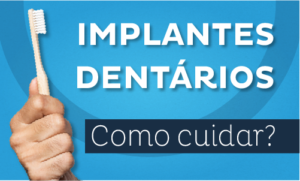
Dental implants are the best option for replacing lost teeth, as with them you can recover chewing and aesthetic function without having to resort to prosthetics that hurt and need to be removed throughout the day. Dental implants are increasingly popular, providing results that last a long time, with the patient extremely satisfied. But make no mistake, just like any other prosthesis, implants require special care to avoid problems for you.
The main concern you should have is oral hygiene. Implants need care just like teeth and it is essential to brush well after every meal, using a soft-bristled brush and a suitable toothpaste. Furthermore, it is important to use dental floss daily to remove food residue that may accumulate between the implants and adjacent teeth, or another hygiene instrument that your dentist recommended to you!
Another essential precaution is to avoid attitudes that could compromise the stability of the implants. For example, biting on hard objects, such as pencils or pens, can cause damage to implants and prosthetics. Furthermore, it is important to treat habits such as bruxism (teeth grinding), which can lead to wear on the implants. Avoiding foods that are very hard, sticky or that may cause discomfort when chewing can prolong the life of your dentures.
Regular visits to the dentist are very important to assess the condition of the implants and make possible adjustments. It is recommended that you have an appointment at least every six months to monitor your oral health and prevent future problems. During these visits, the dentist can perform a professional cleaning and indicate any additional care needed.
Remember that taking care of implant prostheses is essential to ensure their proper functioning and overall oral health. Proper oral hygiene, a balanced diet, regular visits to the dentist and the adoption of good habits are essential to enjoy the benefits of dental implants for many years.
Therefore, if you have dentures on implants, follow these tips and maintain a care routine. This way, you will be able to enjoy all the benefits of this technique, recovering your quality of life and your smile.
Dr. Lucas Telles
Scientific Consultant

